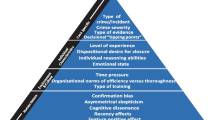We consider a model of optimal law enforcement where sanctions are reduced for self-reporting individuals. Violators get private signals about their individual probabilities of apprehension after they committed a crime. Since violators will self-report if and only if the signal is above a specific threshold, the possibility of self-reporting has an option value that leads to a higher crime rate if the authority's effort remains unchanged. We demonstrate that self-reporting nevertheless increases social welfare even under the restriction that the crime rate must not be higher than without self-reporting.
Similar content being viewed by others
Author information
Authors and Affiliations
Additional information
Received June 15, 2001; revised version received December 19, 2001
Rights and permissions
About this article
Cite this article
Feess, E., Heesen, E. Self-Reporting and Ex Post Asymmetric Information. JEcon 77, 141–153 (2002). https://doi.org/10.1007/s00712-001-0539-0
Issue Date:
DOI: https://doi.org/10.1007/s00712-001-0539-0




